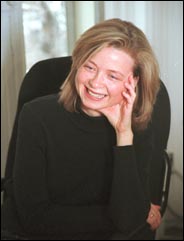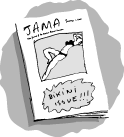kaleidoscope
Trish Duff:
Dependable and diplomatic
 Trish Duff
Trish Duff
PHOTO: OWEN EGAN | |
E-mail is a girl's best friend — at least if the girl has to help a potential 160,000 people in 45 countries keep in touch with each other and with their alma mater. Trish Duff, alumni relations officer for all of McGill's alumni branches outside Montreal and Toronto, does just that.
"I don't know how this job got done without e-mail," she exclaims from her office in Martlet House. "It's a godsend."
Duff is responsible for helping McGill's roughly 100 existing branches organize events. She'll make suggestions, pass on the successes of other branches, find out if and when Principal Bernard Shapiro — or any other McGill speaker — is available to visit and what he likes to eat.
Duff's efforts are appreciated by the "volunteers," those alumni who are branch members.
"She's always been there for me," says Heidi Allardyce, president of the Atlanta branch. "She always gets the answers for me and her response time is incredibly quick."
Allardyce began reviving her dormant branch four years ago and now has 247 members thanks, in part, to Duff's help. When the president was looking for a speaker for her physician-rich membership, Duff suggested Dean of Medicine Abraham Fuks and did much of the work to set it up. She did likewise for Dick Pound, Allardyce's branch's first speaker. "The thing gained momentum thanks to the coordination from McGill."
Duff makes sure that winning inititaives or successful ideas developed by one branch get passed on to others. When Allardyce wanted information on conducting a survey of her membership, for instance, Duff sent her samples of surveys done elsewhere.
"Her role with me is as a sounding board. I'll discuss with her my concerns about an event not attracting enough people, for instance, and she has the information or ideas to reassure or guide me."
Duff is also appreciated by her colleagues. Last spring she won a Rising Star Award, granted by the Canadian Council for the Advancement of Education, having been nominated by Susan Reid, director, planned gifts, and Honora Shaughnessy, executive director of alumni relations.
"No matter how far a volunteer may be from Montreal, Trish keeps on making them feel as if they are just around the corner and very important indeed," wrote Reid in her nomination letter.
"She's just a natural for alumni relations," says Shaughnessy. "She instils a sense of confidence in the volunteers."
Maintaining those links are important. McGill's fundraising success in the past has been tied to its ability to maintain a good relationship with its graduates. Alumni are also starting to play a more active role in helping the University's student recruitment efforts. And well-placed McGill graduates are often valuable ambassadors for the University in developing links to industry or to institutions in other countries.
Duff's not exactly sure where she gets her ability to listen and help with organizational tasks. True, she did graduate in psychology from McGill. But she gives a lot of credit to a course she took in the Faculty of Education with the title: Crisis Intervention Processes.
"It taught me about active listening, letting people have their say then mirroring back to them what they said."
As for being an organizer, Duff is just one of those people who makes things happen. She was the one to help organize the carnival, talent show and graduation at Beaconsfield High. And with her "gang of girlfriends," Duff is always the one to get them together though, she emphasizes, she does not organize her bookclub.
Diplomacy is also a necessary ingredient in her job. "We do have our challenging volunteers," as Duff puts it, explaining that these can be people who refuse to give up the presidency, for instance, even though McGill recommends a two-year-only term. And some may not be doing quite what the office thinks should be done or may not be doing enough.
Saying as much, without offending, takes tact. Duff believes that she and her three siblings were raised to be diplomatic. "It was that polite British thing," she says with a chuckle. Though she does think that she, the third in the family, may have played a particular diplomatic role in smoothing relations between her eldest sister and her parents.
Duff likes her work; she likes the contact with alumni, both over the wires and in person, when once per year she travels to the larger branches, such as Vancouver and Toronto, and once every two years she gets to the likes of New York, Boston and the Maritimes.
Hong Kong, Singapore, Paris and London, alas, are not destinations even though Duff does take care of those branches. She's particularly inspired by her volunteers' "spirit of wanting to give back to the University."
Outside of work, she takes her inspiration from nature. When she can, Duff retreats to the family country home in the Eastern Townships. "The stillness and the power of the landscape... it's a place where I can find time and inspiration to think."
 |
||||
|
There was a time when, going on a train, I could close my eyes and hear people talk and know exactly what they looked like. Now I can't. And that's just great. |
||||
Cover girls
 ILLUSTRATION: TZIGANE
ILLUSTRATION: TZIGANE
| |
Jocelyn Clark is fed up of encountering a certain magazine with its sexist and demeaning images of women on its covers and she's letting the world know about it.
Is her target Penthouse or Playboy? Nope.
Clark, a doctoral student at the University of Toronto and a research associate at the Centre for Research in Women's Health, is angry with the Journal of the American Medical Association (JAMA), one of the world's leading journals for medical research.
While most medical journals display only text on their covers, JAMA has distinguished itself by featuring various works of art since the 1960s.
Clark reviewed the covers for a year and says she's found that much of JAMA's cover art depicts women as objects of desire and men as powerful authoritarian figures.
"Given JAMA's prestige and credibility, there is an implication that the art selection has undergone a critical review consistent with the extensive process of peer-review of research being presented between the covers," says Clark.
While men on the covers tend to come across as scholarly or powerful, women are often portrayed as submissive or sexualized.
"I think we all know that fine art, like other cultural products, has portrayed the roles of men and women in a historical context," Clark says. "But what I find problematic is that the current selection process is reinvesting in outdated messages. The editors are limiting themselves by not choosing from a broader range of work including abstract, modern and contemporary art or work by women painters."
An official for the American Medical Association, JAMA's publisher, declined comment on Clark's views.
Source: University of Toronto Bulletin
 |
||||
|
Hypnosis is a valid altered state, and not some parlour [game] with people running around like chickens. |
||||
Them bones, them bones

| |
The controversy over York University's alliance with the Canadian Memorial Chiropractic College rages on.
York's senate voted in 1998 in favour of an affiliation between York and the CMCC that would result in a doctoral chiropractic degree program to be offered at York.
The decision enraged some. A group of York science professors created a web site criticizing the affiliation and began a petition which attracted the signatures of Nobel Prize laureates Baruj Benacerraf and Arthur Kornberg, urging York to cancel the deal.
A recent series of articles on the Canoe web site charges the CMCC with misrepresenting its associations with Canadian universities and hospitals in its submissions to York. The Canoe journalists also write that the CMCC holds up certain studies of chiropracty as evidence of its efficacy, when the studies in question actually present results that are rather mixed.
At a day-long symposium on chiropractic at York, Ian Coulter, past president of the CMCC, said studies indicate that chiropracty teaches more basic science than traditional medical programs.
He acknowledged that some chiropractors engage in questionable practices, adding, "I don't know any profession not doing off-the-wall things." Coulter and other presenters pointed to studies that indicate chiropractic is effective for treating lower back pain.
A particularly touchy area is subluxation theory. Subluxations are the spine problems some chiropractors claim to be able to treat in order to improve total body health. While Coulter distanced himself from the theory, the Canoe journalists wrote sublaxations "are to chiropractors what germs are to medical doctors," this despite the fact that chiropractors "can't even provide scientific evidence that subluxations exist at all."
York is currently reviewing the idea of establishing the chiropractic degree program.
Source: Canoe, York University Gazette

